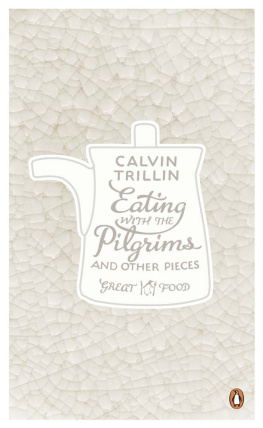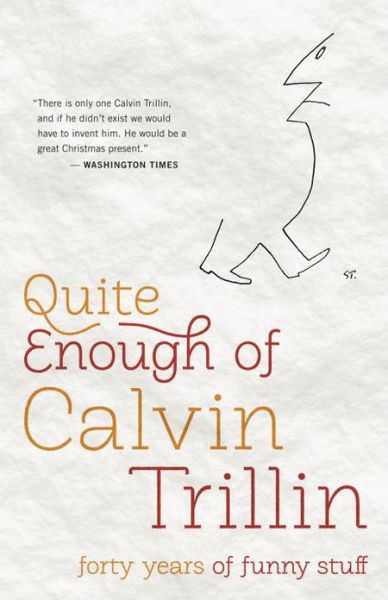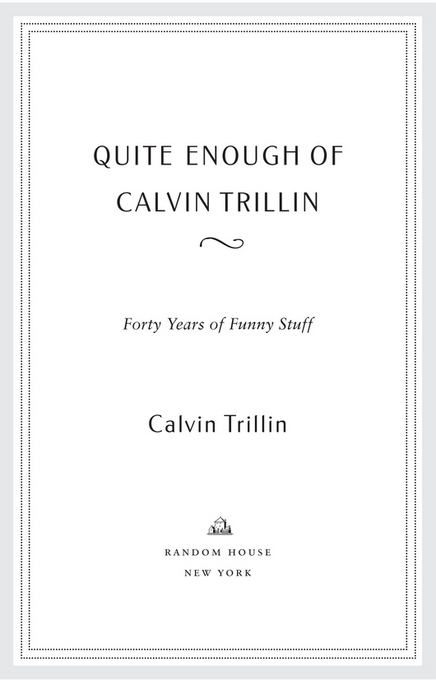All rights reserved.
Published in the United States by Random House, an imprint of The Random House Publishing Group, a division of Random House, Inc., New York.
R ANDOM H OUSE and colophon are registered trademarks of Random House, Inc.
All of the pieces that appear in this work have been previously published, some in different form.
Jacket drawing: Saul Steinberg, Looking Back, c. 1953
Ink on paper, 13 1/8 10 1/8
Private collection
Originally published in The New Yorker, December 26, 1953
The Saul Steinberg Foundation/Artists Rights Society (ARS), N.Y.
Authors Note
These pieces have appeared in, among other places, The New Yorker, The Nation, a newspaper column syndicated by King Features, The New York Times, and various books. Some of them have been trimmed or merged or otherwise altered, but they remain in their period. Salaries have not been multiplied to account for inflation. VCR references have not been transformed into TiVo references.
BIOGRAPHICALLY SPEAKING
Ive found that a lot of people say theyre from Kansas City when they arent. Just for the prestige.
Chubby
Its common these days for memoirs of childhood to concentrate on some dark secret within the authors ostensibly happy family. Its not just common; its pretty much mandatory. Memoir in America is an atrocity arms race. A memoir that reveals incest is trumped by one that reveals bestiality, and that, in turn, is driven from the bestseller list by one that reveals incestuous bestiality.
When I went into the memoir game, I knew I was working at a horrific disadvantage: As much as I would hate this getting around in literary circles in New York, the fact is that I had a happy childhood. At times, Ive imagined how embarrassing this background would be if I found myself discussing childhoods with other memoirists late at night at some memoirist hangout.
After talking about their own upbringings for a whilethe glue-sniffing and sporadically violent grandmother, for instance, or the family tapewormthey look toward me. Their looks are not totally respectful. They are aware that Ive admitted in print that I never heard my parents raise their voices to each other. They have reason to suspect, from bits of information Ive let drop from time to time, that I was happy in high school. I try desperately to think of a dark secret in my upbringing. All I can think of is Chubby, the collie dog.
Well, theres Chubby, the collie dog, I say, tentatively.
Chubby, the collie dog? they repeat.
There really was a collie named Chubby. I wouldnt claim that the secret about him qualifies as certifiably traumatic, but maybe it explains an otherwise mysterious loyalty I had as a boy to the collie stories of Albert Payson Terhune. We owned Chubby when I was two or three years old. He was sickly. One day Chubby disappeared. My parents told my sister, Sukey, and me that he had been given to some friends who lived on a farm, so that he could thrive in the healthy country air. Many years lateras I remember, I was home on vacation from collegeChubbys name came up while my parents and Sukey and I were having dinner. I asked why wed never gone to visit him on the farm. Sukey looked at me as if I had suddenly announced that I was thinking about eating the mashed potatoes with my hands for a while, just for a change of pace.
There wasnt any farm, she said. That was just what they told us. Chubby had to be put to sleep.
Put to sleep! I said. Chubbys gone?
Somebodymy mother, I thinkpointed out that Chubby would have been gone in any case, since collies didnt ordinarily live to the age of eighteen.
Isnt it sort of late for me to be finding this out? I said.
Its not our fault if youre slow on the uptake, my father said.
I never found myself in a memoirist gathering that required me to tell the story of Chubby, but, as it happened, I did relate the story in a book. A week or so later, I got a phone call from Sukey.
The collie was not called Chubby, she said. The collie was called George. You were called Chubby.
1998
Geography
Geography was my best subject. You can imagine how I feel when I read that the average American high school student is likely to identify Alabama as the capital of Chicago. I knew all the state capitals. I knew major mineral resources. Missouri: lead and zinc. (Thats just an example.) I learned so many geographical facts that Ive had to spend a lot of time in recent years trying to forget them so Ill have room in my brain for some things that may be more useful. I dont hold with the theory that everyone is just using a little bit of his gray matter. I think were all going flat out.
For instance, Ive worked hard to forget the longest word in the English language, which I had to learn for a high school club. Pneumonoultramicroscopicsilicovolcanoconiosis. It isnt a word thats easy to work into conversations. There are only so many times you can say, Speaking of diseases usually contracted through the inhalation of quartz dust I finally managed to forget how to spell it, and I was able to remember my Army serial number.
I think my interest in geography grew from the long automobile trips across the country I used to take with my family as a child. I grew up in Kansas City, which is what the real estate people would call equally convenient to either coast. We usually went west. My father would be in the front seat, pointing out buttes and mesas, and my sister, Sukey, and I would be in the back, protecting our territory. We had an invisible line in the center of the seat. At least, Sukey said it was in the center.
There were constant border tensions. It was sort of like the border between Finland and the old Soviet Union. I played Finland. Sukey played the Soviet Union. Then my father did something that we now know was politically retrograde and maybe antifeminist. He told me, We do not hit girls. You will never hit your sister again. Sukey was not visited with a similar injunction. So I became a unilaterally disarmed Finland, while she was a Soviet Union bristling with weaponry. If I hadnt had to be on constant alert because of Sukeys expansionist backseat policy, I might now know the difference between a butte and a mesa.
If I had followed my geographical bent, I would have become a regionalist, a geographer who decides where to draw the lines dividing the regions of the United States, like the Midwest and the South and the New England states. Actually, I do the same sort of thing, without a degree, except I only use two regionspartly because of my math. Math was my worst subject. I was never able to convince the mathematics teacher that many of my answers were meant ironically. Also, I had trouble with pi, as in pi r squared. Some years ago, the Texas State Legislature passed a resolution to change pi to an even three. And I was for it.





